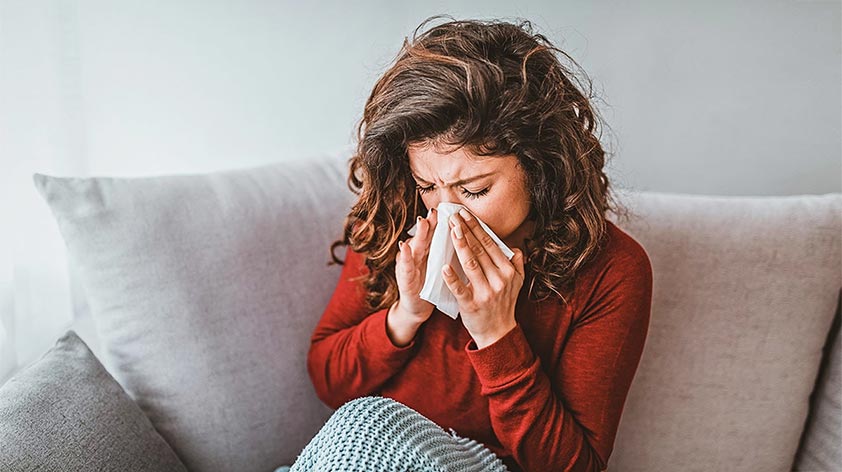
As we get further into the depth of winter, so accompanies the dreaded common cold. The cold is the most widespread of all seasonal bugs, but what can you do to avoid getting sick? Which methods could help you keep healthy through Christmas and beyond? There are a variety of ways to prevent illness. They range from dressing warmly to staying well-hydrated with a home made tea of honey, lemon, and thyme to ward off those winter chills. To learn how to avoid the common cold this winter, you might find these thoughtful suggestions we found from Waterlogic interesting — and when you’re ready to brew your comforting remedy, why not try a water dispenser for boiling water? First read on for How to Fight the Common Cold This Winter!
It starts with a runny nose. Then comes the sore throat — before bouts of sneezing evolve into congested sinuses, leaving you with a sense of winter malaise. Nothing ruins Christmas like the symptoms of the dreaded cold, but it’s a temporal sickness that millions have to deal with throughout the winter months as adults suffer, on average, two or three colds every year.
What is the common cold?
The common cold is a form of rhinovirus infection: a group of over 200 different viruses that affect the nose and throat. People can catch a cold by merely grazing themselves on a surface infected with rhinovirus germs — be it a door handle, a kettle, a keyboard — then touching their eyes or nose. Symptoms typically show a few days after initial infection, and they can last up to two weeks – in severe cases.
While there’s no cure for it once you have a cold, there are several practical things you can do to prevent catching a cold in the first place:
1. Washing your hands regularly for at least twenty seconds helps protect you from getting sick by rinsing away cold-causing germs before you touch your face.
2. Drinking at least 6-8 glasses of fluids every day keeps your body well-hydrated, boosting your immune system to allow your body to fight off the lurking virus.
3. Dressing in winter clothes helps you maintain a healthy body temperature of around 36°C, which research shows can help stop the cold virus from developing in your body.
What’s the difference between a cold and the flu?
The common cold and influenza result from different viruses, but they often bring the same symptoms. The main difference is symptoms of the flu — as influenza are more widely known — feel much more severe than cold symptoms, and they’re often accompanied by fever as the body temperature rises to over 38°C. Flu patients can also feel extreme fatigue and endure severe body aches, while there’s a chance of complications resulting in pneumonia or bacterial infection.
According to research, healthy adults only catch real flu once every five years with the most severe symptoms coming on very suddenly, and typically lasting just 2-3 days, though it can take up to two weeks for the illness to disappear entirely. In extreme cases, medical treatment can be required — with up to 5,000 patients hospitalized in the UK each year and 1,600 influenza-related fatalities.
If you catch a cold, try to avoid spreading any germs. Carry paper tissues so you can cover your mouth if you have to cough or sneeze. Make sure you keep your home and workspace clean, sanitizing keyboards, surfaces, and doorknobs with a disinfectant wipe to remove any traces of the virus. Better still, if you feel unwell, stay at home: it takes just four hours for a virus to contaminate up to 60% of surfaces when only one infected employee arrives at work, so stay out of the office.
Why are people more prone to catching a cold in the winter?
Some groups of people are more prone to catching a cold than others. Infants below two years of age can catch up to eight colds-a-year as they haven’t yet built up the immunity to ward off the full spectrum of rhinoviruses, while any child under the age of six is at the highest risk of catching a cold.
Elderly patients over 75 years of age are up to fifty times more likely to catch a cold than younger adults: again, mainly down to the fact they have a weaker immune system. In fact, if your immune system is compromised for any reason — chronic illness, pregnancy, that you smoke — you’re at a higher risk of catching a cold.
No matter what your age, you’re likelier to catch a cold during the winter months. According to a Yale study, the rhinovirus replicates more efficiently at cooler temperatures, so winter is the perfect time for the common cold to multiply.
Additionally, our bodies are less capable of battling the virus if our internal body temperature is lower. When winter swings around, a drop in the air temperature makes everyone more prone to catching a cold with rates of illness going up in September, and remaining elevated through until April.
How to protect your children, family and work team from the common cold?
Illness is a massive drain on productivity in the United Kingdom. A Britain’s Healthiest Workplace survey estimates that sickness-related absences cost UK businesses £77.5 billion a year. Keeping employees, well-hydrated is critical to a healthy workforce as fluids are crucial to every bodily function, not only carrying vitamins and nutrients around your body but also flushing bacteria and toxins out of your system.
Sleep is just as critical in combatting the common cold. The NHS highlights how those who sleep less than five hours a night are four-and-a-half times more likely to catch a cold than those who sleep at least seven hours: ensure your team finds time to rest, and you’ll help keep them at work.
What if someone does succumb to illness? Then reaching for over-the-counter medicines like paracetamol or ibuprofen is an effective way to combat the most severe symptoms. If you prefer to avoid medication, certain superfoods can help to fight illness with natural formulas such as black green tea with lemon, offering a potent remedy.
When should you seek medical advice?
Most of the time, you won’t need to see a doctor for a cold. The NHS recommends you only seek medical advice if you see no signs of improvement in symptoms after three weeks; or, if your condition deteriorates at any point. Common colds are a nuisance, but they shouldn’t be cause for concern. They will clear up on their own within a week or two — provided you get enough rest, take sufficient fluids, and avoid excessive winter chill.
If you experience overtly severe symptoms such as trouble breathing, chest pain, or persistent vomiting, you should consult a doctor immediately.









